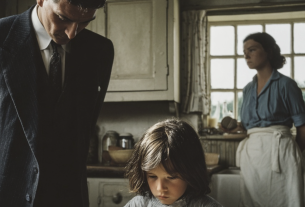Marina sighed, staring at the computer screen. The numbers in the report blurred before her eyes—it was already eleven at night, and she was still at the office. Being the head of the marketing department at a large IT company demanded total commitment, but the pay matched the effort. At thirty-two, she earned more than many men, and she was proud of it.
Her phone buzzed—a message from her husband, Alexey: “Mom is asking again when you’ll come. She says we need to talk about something important.”
Marina closed her eyes. Olga Petrovna, her mother-in-law, had come to visit for the weekend and for the third day in a row hadn’t missed a chance to lecture her on a woman’s purpose. Every time it was the same: “A woman must have children,” “A career is a man’s business,” “Look at you—thirty-two and no kids.”
Gathering her documents into her briefcase, Marina headed for the elevator. On the way home she mentally prepared for the next attack. Olga Petrovna was a strong-willed, persistent woman. At fifty-eight she looked younger than her years, held herself straight, and spoke with the confidence of someone used to being right.
At home, Marina was greeted by the usual scene: Alexey sat silently at his laptop, while his mother paced the living room, talking animatedly about something. At the sight of her daughter-in-law, Olga Petrovna broke off mid-sentence.
“Well, here’s our career woman,” she said with a sting. “Out at work till all hours again? And your husband sits at home alone like an orphan.”
“Good evening, Olga Petrovna,” Marina replied wearily, taking off her coat. “We had an important client presentation today.”
“What presentation!” the mother-in-law threw up her hands. “You’re already thirty-two! When will you finally come to your senses and have children? Alexey wants to be a father, and you’re busy chasing a career!”
Marina glanced at her husband. Alexey looked up from the screen but said nothing. She and Marina had discussed this more than once and decided children could wait another couple of years. Right now it was important to secure their new positions, buy a larger apartment, and build a financial safety cushion.
“Olga Petrovna, Alexey and I are adults. We’ll decide for ourselves when to have children.”
“You’ll decide for yourselves!” the mother-in-law snorted. “And then what? Your age won’t allow it, and then what? You’ll regret wasting your youth on reports and meetings!”
Marina headed to the kitchen, hoping to avoid continuing the conversation, but Olga Petrovna followed her.
“Do you know what Tamara Ivanovna told me?” she would not let up. “Her daughter-in-law was building a career too, and at thirty-five she found out she couldn’t have children. Now she’s suffering! She could have raised three by now!”
“Olga Petrovna, can we talk about this tomorrow? I’m very tired.”
“Tired!” the mother-in-law repeated with contempt. “And who’s going to create a cozy home? Look at this apartment—dust everywhere, the fridge is empty! Your husband eats whatever he can find while you’re off doing your important work!”
Marina clenched her fists. The apartment was immaculate—a cleaning service came twice a week. And the refrigerator was stuffed with food; Olga Petrovna was simply used to eating different things.
“A woman should be the keeper of the hearth,” the mother-in-law went on, “not run around offices like a man in a skirt. I’m ashamed to tell the neighbors what you do!”
“What, exactly, is wrong with my job?” Marina finally snapped.
“What’s wrong is that it isn’t women’s work! Being a manager means responsibility, stress, negotiating with men. A woman should be gentle, tender, caring. You’ve become hard, businesslike. Alexey needs a wife, not a colleague from the office!”
The next morning, the situation repeated itself. Over breakfast, Olga Petrovna again brought up children and a woman’s purpose. She talked about her friends whose daughters-in-law had already had two or three kids, and cast reproachful looks at Marina.
“Svetlana Volkova already has a granddaughter starting school!” she said. “Imagine the joy! And I’m still not a grandmother!”
Alexey drank his coffee in silence, only occasionally lifting his eyes from his phone. His silence irritated Marina more than her mother-in-law’s attacks. Why couldn’t he defend her? Why did he allow his mother to talk to her like that?
That evening, when Olga Petrovna went to the store, Marina decided to have an honest conversation with her husband.
“Alyosha, I need to talk to you,” she said, sitting down beside him on the sofa.
“About what?” he asked without looking up from his laptop.
“About your mother. I can’t take her constant jabs at my job anymore. Why don’t you defend me?”
Alexey sighed and closed the laptop.
“Marina, what do you want? She’s my mother. She worries, she wants grandkids. It’s natural.”
“Wanting grandkids is natural. What isn’t natural is insulting me every day! She says she’s ashamed to tell the neighbors where I work. And yet it’s on my salary that we live! If your mother is so ashamed of what I do, then why does she ask us for money every week?”
“Don’t exaggerate. My salary’s not bad either.”
“Alyosha,” Marina took her husband’s hand, “I make twice as much as you. It’s my income that lets us live in this apartment, go on trips, and buy quality things. And it’s my money your mother is constantly asking to borrow.”
Alexey frowned.
“What does money have to do with this?”
“It’s hypocritical to say you’re ashamed of my work, and then keep asking for the money that work brings in.”
“She doesn’t ask every week,” Alexey began to object, but Marina cut him off:
“Every week, Alyosha. Either for medicine, or for repairs, or just ‘until payday.’ In the last six months we’ve given her almost a hundred thousand rubles.”
Alexey fell silent. He knew his wife was right, but admitting it would mean taking a stand against his mother.
“Listen,” Marina said suddenly, “what if I do exactly what your mother wants?”
“What do you mean?”
“I’ll say I’m quitting. I’ll become the perfect housewife. I’ll cook borscht and bake pies. Isn’t that what your mother wants?”
Alexey looked at his wife in surprise.
“Are you serious?”
“Completely. But there’s one condition—you have to back me up. If your mother starts in again about a woman’s purpose, you’ll say I took her advice.”
“But Marina, we agreed…”
“Agreed on what? That you’ll sit there in silence while your mother humiliates me? Alyosha, I’m tired of this. Either we try my plan, or I seriously reconsider our marriage.”
Alexey looked at his wife, bewildered. There was such resolve in her voice that arguing was pointless.
When Olga Petrovna returned from the store, Marina greeted her with the sweetest expression.
“Olga Petrovna, I wanted to talk to you,” she said. “I thought about what you said and realized you’re right.”
Her mother-in-law eyed her warily.
“Right about what?”
“About my job. About how a woman should look after the home. I’ve decided to quit.”
Olga Petrovna was so taken aback she sank onto a chair.
“Really?”
“Really. I’ll submit my resignation tomorrow. I’ll be the perfect wife and homemaker. I’ll cook, clean, run the household. And in a year or two, Alyosha and I will definitely have children.”
A victorious smile spread across the mother-in-law’s face.
“At last!” she exclaimed. “I knew that deep down you understood you were wrong! A woman should be a woman, not pretend to be some businesswoman!”
Alexey watched in silence. He felt awkward, but he kept his word to his wife.
“Yes, Mom,” he said, “Marina made the right decision. Now she’ll have time to take care of the home.”
“Good girl!” Olga Petrovna beamed. “Before, you ran around like a mad thing—nervous, angry. Now you’ll become a real woman!”
For the next two weeks, Olga Petrovna was over the moon. She told all her acquaintances about her victory: she had finally brought her daughter-in-law to her senses! Now Alexey would live as a man should, and his wife would devote herself to the home and family.
But her joy dimmed when she once again asked the kids for money for medicine.
“Mom,” Alexey said, glancing at his wife, “money is tight right now. Marina quit; we’re living on my salary. It barely covers the mortgage and groceries.”
“What do you mean, barely?” Olga Petrovna couldn’t believe it. “You earn good money!”
“Mom,” Marina said gently, “we only have one income now. Alexey makes fifty thousand; thirty goes to the mortgage, fifteen to groceries and utilities, and the rest to transportation, clothes, household needs. There’s practically nothing left over.”
Olga Petrovna looked at her son, taken aback.
“But how? You always helped before…”
“Before, we had different income,” Marina replied calmly. “Now I’m a model housewife, just as you wanted.”
In the following days, Olga Petrovna tried several more times to get financial help, but each time she heard the same thing: there was no money. Her medicine was expensive, retirement was still seven years away, and she had practically no savings.
“Maybe you could find some simpler job?” she suggested timidly to Marina. “Not so demanding. Just to earn a little extra.”
“Olga Petrovna,” Marina said in surprise, “what about your principles? You said a woman shouldn’t work!”
“Well… in extreme cases… she can earn a little,” the mother-in-law muttered, embarrassed.
“No, no,” Marina shook her head. “You convinced me that a woman should only take care of the home. I’m a model wife now. I cook, clean, run the household. I won’t work.”
A week later, Olga Petrovna tried one last time:
“Marina, please help at least a little. I need ten thousand for medicine.”
“Olga Petrovna,” Marina explained patiently, “we don’t have a spare ten thousand. If we give it to you, we’ll be without food for a week.”
“But before…”
“Before, I was working.” Marina looked at her mother-in-law steadily.
Alexey nodded:
“Yes, Mom, it’s odd. You’re ashamed of Marina’s job, yet you ask for the money that job brings.”
Olga Petrovna flushed. She realized she’d been caught in her own trap.
“I didn’t ask every week,” she objected weakly.
“Mom,” Alexey said gently but firmly, “in the last six months you’ve asked for help fourteen times. Marina kept records. The total is ninety-seven thousand rubles.”
His mother-in-law fell silent. For the first time in many years, she had nothing to say.
The next evening, Olga Petrovna asked to speak to her daughter-in-law alone.
“Marina,” she said, “I wanted… I need to tell you…” She paused, choosing her words. “Maybe I was wrong about your work.”
“In what sense?” Marina asked.
“In the sense that… well… modern women can work. Times have changed. And if you’re good at it…”
“Olga Petrovna, do you want me to go back to work?”
“I want you and Alyosha to be happy,” the mother-in-law answered cautiously. “And for that… well, money is probably necessary too.”
Marina smiled. For the first time since they’d met, Olga Petrovna was speaking to her as an equal.
“You know what,” she said, “I’ll think about going back to work. But on one condition.”
“What condition?”
“You won’t interfere in the decisions Alexey and I make anymore. When to have children, how to divide responsibilities, who should work—that’s our business. We’re adults and we know what we need.”
Olga Petrovna was silent for a moment, then nodded.
“Agreed. And… Marina… forgive me. I understand now that I was wrong.”
“Olga Petrovna,” Marina held out her hand, “let’s start over. You mean a great deal to Alexey, and that means a lot to me too. Let’s just respect each other.”
Six months later, Olga Petrovna proudly told the neighbors about her daughter-in-law—the successful department head at a major company. And yes, there were still no grandchildren yet, but no one cared anymore. What mattered was that the kids were happy and lived in harmony.
And when Olga Petrovna occasionally asked for help with medicine or a small repair, no one threw her past reproaches back in her face. Because helping family is normal, but humiliating your loved ones is not.
Marina understood the main thing: sometimes people have to feel the consequences of their words and actions to realize where they were wrong. And Olga Petrovna learned her lesson: adult children have the right to decide for themselves how to live.



